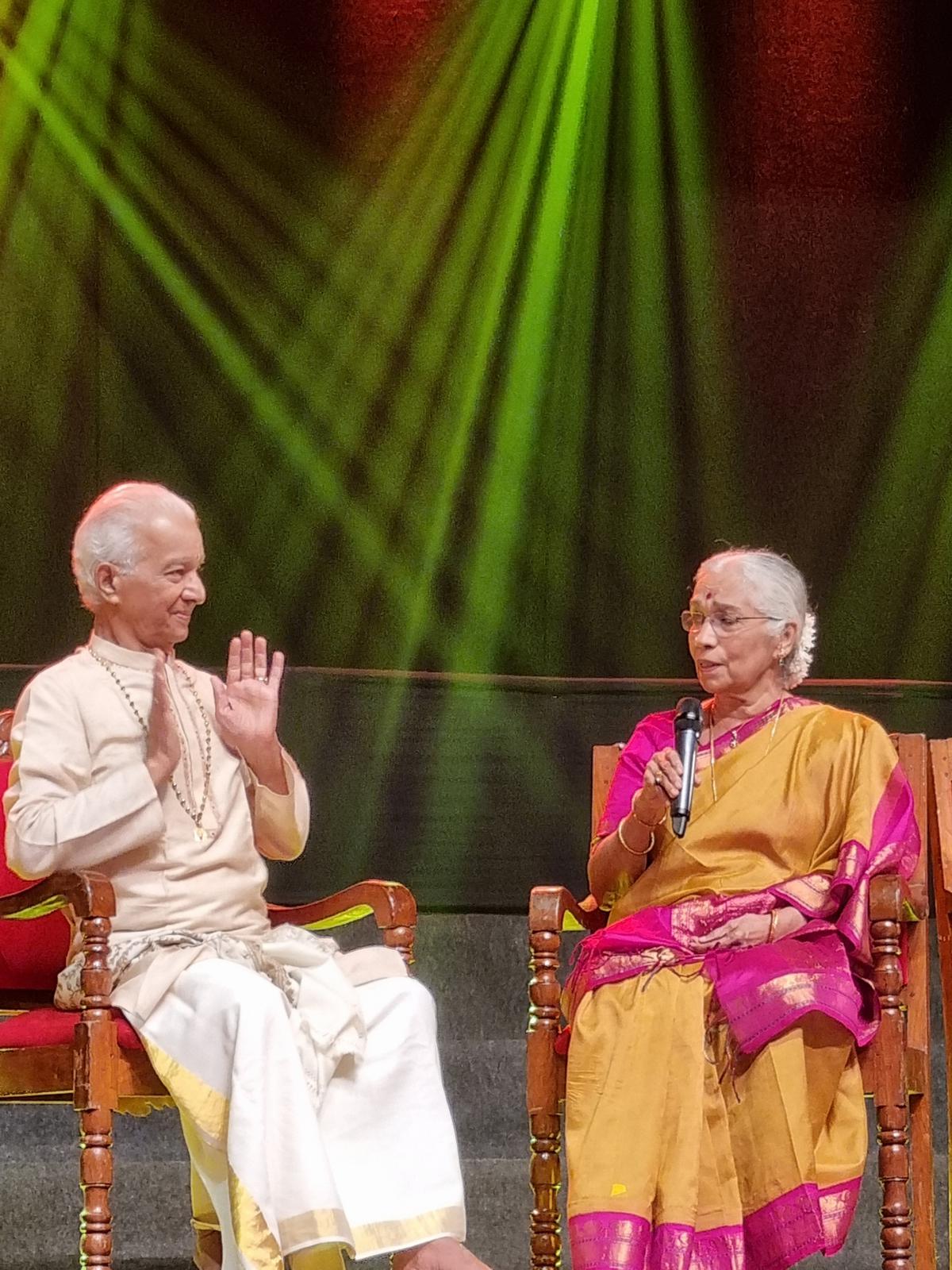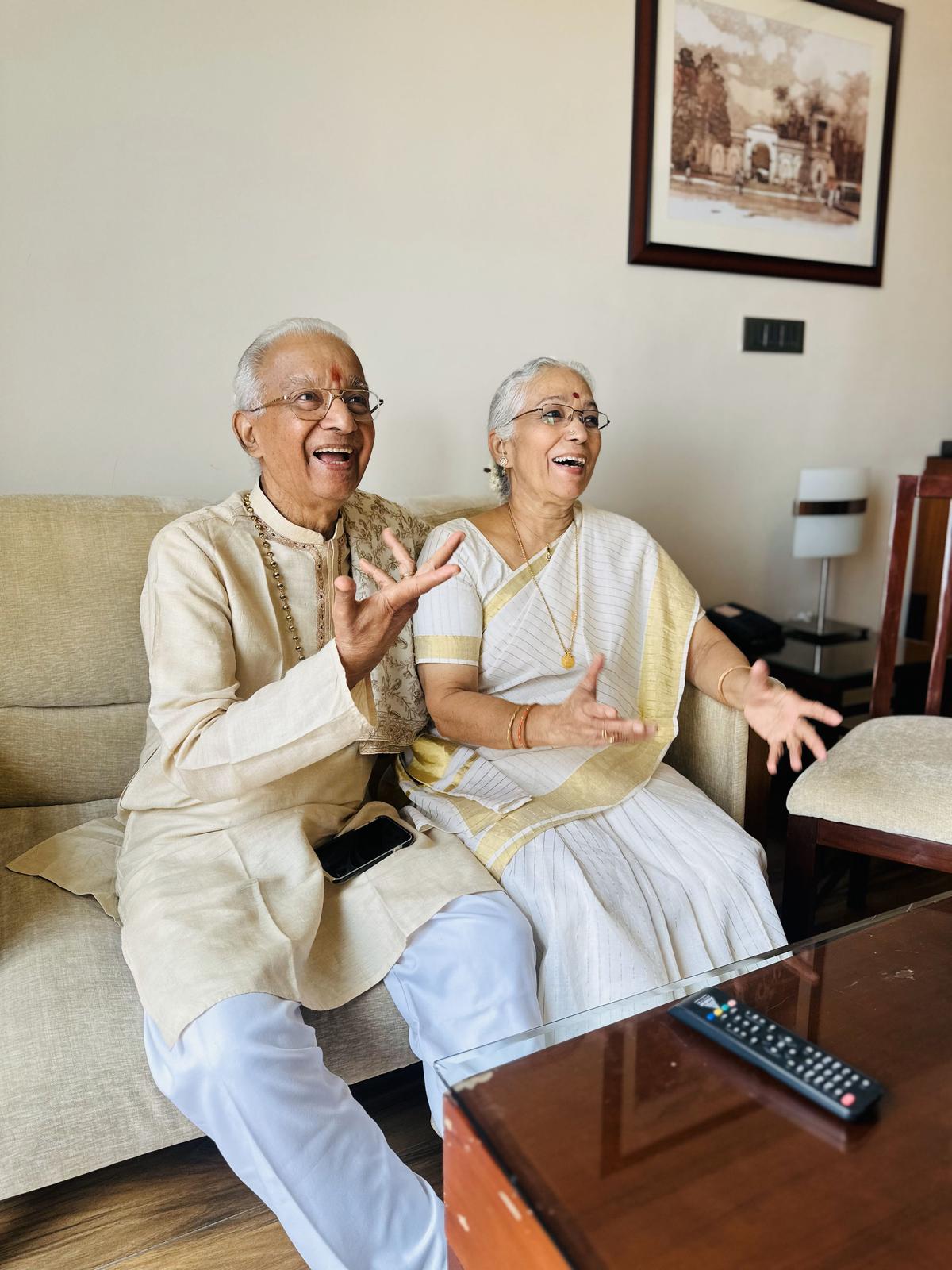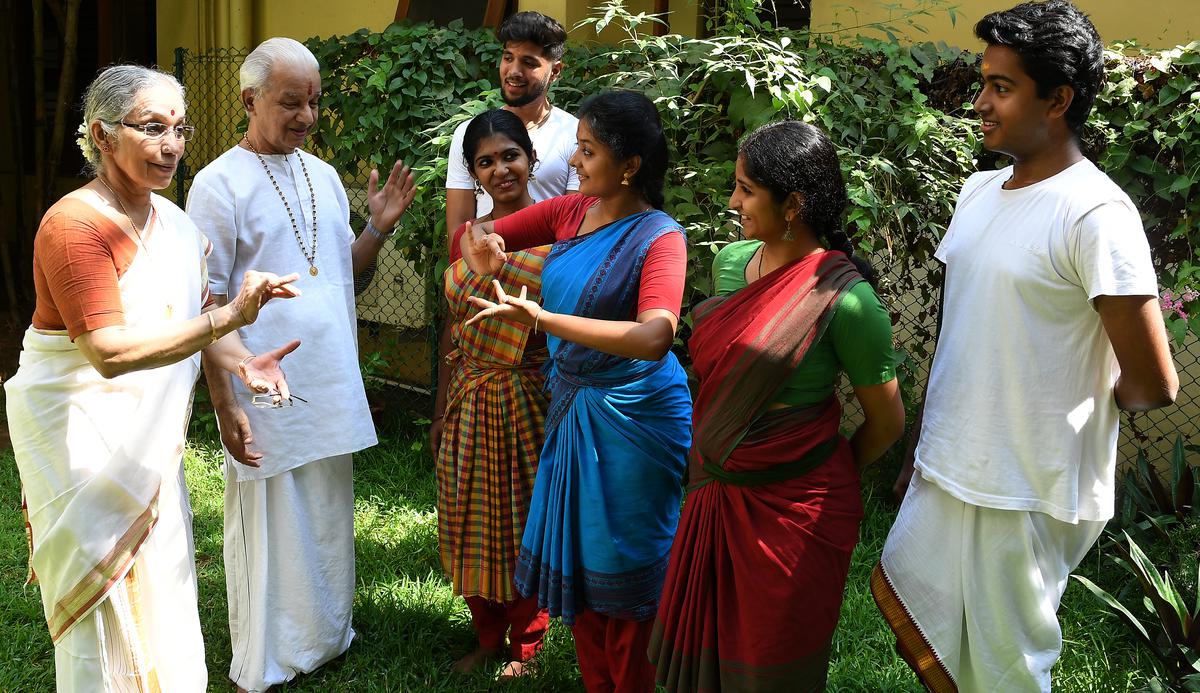Bharatanatyam artists Dhananjayan and Shanta Dhananjayan make their presence felt in cinema
Meeting and conversing with the Dhananjayans is to have one’s happy molecules re-energised. In Thiruvananthapuram, to inaugurate Regatta’s 51st Natya Sangeetholsavam, Padma Bhushan awardees VP Dhananjayan and Shanta Dhananjayan spoke about the happenings and changes in their lives and work, especially during the pandemic and after.

PV Dhananjayan and Shantha Dhananjayan inaugurating Regatta’s 51st Natya Sangeetholsavam in Thiruvananthapuram.
| Photo Credit:
Ambili Ramnath
Thus away from the whirl of rehearsals and the arc lights, the Dhananjayans decided to use the time, albeit forced, to turn to the spring of creativity, to craft, compose and delve deeper into their souls. “Our compositions during this period and thenceforth reflect this mind-set of ours,” explains Shanta Dhananjayan.
Socially relevant compositions
“Through them, we wanted to convey messages that would have a social resonance, be educative and reflect the practical philosophy embedded in our cultural heritage. And we consciously moved away from mythological topics.”

PV Dhananjayan and Shantha Dhananjayan
| Photo Credit:
Special arrangement
Thus was born the major production ‘Shadripu’ — six enemies of the mind that stand in the way of one’s spiritual progress – kama (desire), krodha (anger), lobha (greed), moha (delusion), mada (arrogance) and matsarya (jealousy) — as outlined in Indian philosophy. To illustrate the consequences of being prone to these vices, stories from the Bhagavatham, the Panchatantra and contemporary sources were used. Veering away from the usual varnam pattern, this Nrityopahaaram used the jathis “as communicative expressive narration”.
‘Amma’ a pada varnam on the biological mother penned by Dhananjayan Master, and a thillana in Madhyamavathi, written and choreographed by Shanta, are their noteworthy contributions to their repertoire, created during the lockdown.
The combat against COVID-19 brought forth yet another trendsetter from the dancer-couple. Taking up a concept mooted by their son, Satyajit, they conducted an online arangetram of a student. A full-fledged margam that was watched by thousands across the globe was received as a godsend by many teachers and students of Natyam, who happily took up the cue.
Online classes
“While online classes are a dime a dozen these days, and it served a purpose during the pandemic, I would never suggest it for children and young students of classical dance, especially. It makes the whole exercise casual and distractive and takes away the sanctity of the guru-shishya relationship, which is so important in the practice of any classical art,” avers Dhananjayan Master. “However, on the positive side, it is a helpful aid for teachers and senior students with whom we conduct workshops online,” adds Shanta akka, as she is warmly referred to.
“The medium is used to clear doubts and discuss ideas, and, above all, it keeps alive the relationship with our Bharatakalanjali family of teachers and students across the globe. The point is to use it judiciously,” adds Shanta akka.
So will we get to see the Dhananjayans on stage anytime soon? “Not likely; we have retired,” she says graciously, but firmly. “We continue to guide, instruct and oversee the running of Bharatakalanjali along with our senior teachers. We are confident that the body of work we have created is safe in their hands.”
Expanding horizons
Happily, however, the Dhananjayans continue to practise Natyam of a different genre — one that is less demanding physically. Their highly popular appearances in the Vodafone ads have brought in many offers from the big screen.
A still from an advertisement featuring PV Dhananjayan and Shantha Dhananjayan
| Photo Credit:
Special arrangement
Sarvam Thalamayam opposite Nedumudi Venu and Vasanthabalan’s Aneethi are Shanta akka’s notable roles on screen. The soon-to-be-released Dhruva Natchathiram by Gautham Vasudev Menon features Dhananjayan in a prominent role. “I used to dismiss films as a flippant art. But having involved myself, I realise the hard work, the on-the-spot creativity and the harsh demands the medium makes on every member of the team. I see it in a totally different light now!” admits the master with disarming frankness.

Bharatanatyam exponents VP Dhananjayan and Shantha Dhananjayan teaching students at Bharatakalanjali in Chennai.
| Photo Credit:
K V SRINIVASAN
Shanta has just completed shooting in Jaisalmer for Lijo Jose Pellissery’s period movie, Malaikottai Vaaliban, in which she plays a kalari gurukkal — an exercise that she greatly enjoyed. Always open to learning, she appreciates the difference between live abhinaya on stage and emoting before the camera amidst many takes.
What do the couple do in their spare time? Shanta akka gets busy organising volumes of documents, photos and videos of their work.
The upright and outspoken person that he is, Dhananjayan master regularly writes letters to editors and other related authorities on matters of social concern and those relevant to the classical arts. Thus, he speaks up against the use of garish lights and other gimmicks during classical dance presentations. “These are distractive and detrimental to the effectiveness of the performance and should be avoided.”
Dhananjayan master laments that public authorities and administrators of cultural organisations have not really understood the classical arts or the value of promoting them. “Corporates look for what they believe is the ‘mileage’ they get out of a show they sponsor. What they fail to see is that with classical arts it is lifelong mileage! For there is no life without art,” he says.
For all the latest Entertainment News Click Here
For the latest news and updates, follow us on Google News.
